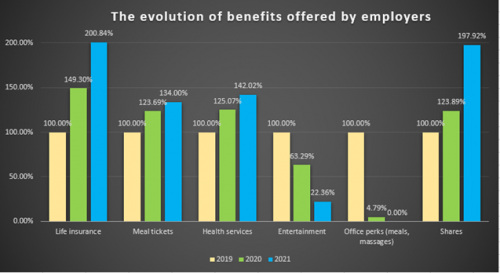
The new world of work calls for an improved compensation strategy: flexible working, mental health programs, and agile leadership
- Flexible working is the most wanted employee benefit in 2021
- Hybrid work arrangements are seen as a boon to employee wellbeing
- Life insurance and equity shares are among the top benefits for employees in IT companies
- Assessing the workload of each team and automating recurring tasks should be on the agenda of the executive management team
The global outbreak has dramatically influenced everything around us, from reshaping personal relationships to affecting our careers, our ways of working, and our future. In every organisation, both employers and employees are struggling, especially in the last period. On one hand, employers are dealing with the issue of employee retention, which has increased significantly in the past period, with workers resigning their jobs, without even having another option lined up, and on the other hand, the employees want to be understood, they want to feel valued, protected, and safe.
After more than a year and a half since the onset of the COVID-19 pandemic, several studies have been published to highlight the impact of the pandemic on people and companies, as well as the new trends in various fields, and we have withdrawn a very important conclusion: employers need to invest in their employees, in order to retain the best talent.
Flexible working is the most wanted employee benefit in 2021
Although this is still a topic that is debated in the public space, the way that we will work in the future will be completely different from the one we were used to before the pandemic started. According to a Gartner study, 75% of their employees affirm that they expect a flexible work schedule, and from what we have witnessed in the market, most companies have already incorporated this flexibility into their list of benefits. The employers who will insist on returning fully to the office will have to manage the resignations of 40% of their employees, who have expressed their intention to leave those employers who will not integrate the remote or hybrid work schedule. Even the employees who are working in the retail sector have expressed that they wish to choose their work schedule in shifts, instead of this being imposed on them, which will put a lot of pressure on the big players in this sector. Also, the pressure to adapt the work schedule to the needs of employees is felt bolt in the construction and telecom sectors.
„The COVID-19 pandemic has also brought to light the inability of the education systems to deliver in atypical conditions, which put a lot of employees, who are also parents, in difficulty. Some of them chose to quit their jobs, while others chose to work late at night to compensate for school hours and thus ended up with episodes of exhaustion and the need for psychological counselling. Certainly, this period tests our limits, but it also gives us the opportunity to find solutions, so that we can overcome the challenge of retaining specialists.”, mentioned Cătălina Călinescu, HR & Payroll Director, Mazars Romania.
Hybrid work supports mental wellbeing for employees
As the vaccination process continues and many employees are starting to return to the office, the conversation around working from home remains. Many large companies in Romania have adopted hybrid work models, which they intend to keep even after the end of the COVID-19 pandemic.
„Since March 2020, there was also an increase in psychological counselling services, trends being reported by major players in the medical services market. We have also noticed that a big number of private companies have included in their benefits package free psychological sessions, with the scope of making sure that their employees have someone specialised to talk to, with whom they could share their worries and challenges.”, mentioned Doriana Anghel, Senior Consultant, Outsourcing-Payroll, Mazars Romania.
According to a Salesforce study, 59% of knowledge workers view hybrid work arrangements as a boon to employee wellbeing, therefore, this is a perk that workers today are seeking out more than the previous benefits that were included in the compensation strategy.
New perks for employees, to suit their new work-life balance
„A study conducted by Willis Tower Watson on a population of over 8 million professionals from 8 different industries, investigates the involvement of employers in supporting employees, who are also parents, to meet the challenges of this period. 30% of employers who initiated internal surveys on the statistical profile of employees, combined with group interviews, have already identified the need to provide alternative childcare services to those employees, who are parents, in the coming period. Also, 20% consider supplementing the benefit policy with backup childcare days during the COVID-19 pandemic.”, mentioned Anca Lamba, Manager, Outsourcing-Payroll, Mazars Romania.
If we refer to the evolution of the benefit packages in the last year, we can draw the following conclusions:
- The disappearance of certain types of benefits granted to employees before the COVID-19 pandemic, such as in-office massages and meals. This is mainly due to the new way of working – teleworking or working from home. Thus, in 2020, the decrease was 95% compared to 2019. In January 2021 - present, these benefits were not granted at all.
- Reducing certain packages of benefits in kind, such as gym memberships and Christmas parties. We can consider that the COVID-19 pandemic and the closure of gyms in certain periods, had an impact in the field of sports and recreational activities. 2021 registered a decrease by another 40% compared to the values recorded in 2020.
- The capping of certain benefits, such as meal vouchers and voluntary pensions. The differences registered at the level of the three analysed years are insignificant, being generated, for example, by the increase of the nominal value of a meal ticket according to the applicable legislation.
- Increasing the granting of certain packages of salary benefits, such as health insurance and life insurance. If at the beginning of 2019, life insurance was the least common benefit in companies, at the end of 2020 there was an increase in their grant by 50% compared to 2019. Regarding the data recorded in 2021, the value of health insurance increased by 17% compared to the values recorded in 2020, while the amounts related to life insurance doubled compared to the values recorded in this category in 2020.
- There was also an accelerated growth in the case of shares offered by companies to their employees. In 2020, 23% more were granted than in the previous year, and in 2021 by 70% more shares than in 2020.
- For an overview of the fluctuations registered in the period 2019 - 2021 in the granting of the main types of benefits to employees by IT companies, you can follow the chart below.
Agile leadership in HR is a must
We can all agree that change is exponential and there’s no getting around it, especially when we are talking about technologies and new business models. The COVID-19 pandemic has generated the development of many new platforms, designed to automate different tasks or processes.
„Another important factor that HR leaders need to take into consideration is the job utilisation business metric, that will analyse the amount of an employee's working time. By putting in place this HR scan, they can assess the workload by considering the following main areas: the nature of the task, the capabilities of the individual performing it, the characteristics of the load and the layout of the environment.”, mentioned Andreea Georgescu, Head of HR Consulting, Mazars Romania.
This way, the HR professionals together with the business leaders, can influence and improve the work-life balance of the employee, which should be a top priority for every management team. At a global level, Portugal has banned bosses from text messaging and emailing staff out of working hours as part of new laws dubbed "right to rest".
Starting now, we believe that we need to pay attention to the global trends and generate a very active communication channel between employers and employees, in order to sustain a positive, healthy and productive work environment.
###
Contact
Emilia Popa, Head of Marketing and Communication, Mazars Romania
emilia.popa@mazars.ro / +40 741 111 042
About Mazars
Mazars is an internationally integrated partnership, specialising in audit, accountancy, advisory, tax, and legal services*. Operating in over 90 countries and territories around the world, we draw on the expertise of more than 42,000 professionals – 26,000+ in Mazars’ integrated partnership and 16,000+ via the Mazars North America Alliance – to assist clients of all sizes at every stage in their development.
*where permitted under applicable country laws.
www.mazars.com | Mazars on LinkedIn
About Mazars in Romania
In Romania, Mazars has over 26 years of experience in audit, tax, financial advisory, outsourcing, and consulting. Our strength lies in the people we work with – the local team has 7 partners and 250 professionals.

